Annotated Bibliography: Evaluating Early Childhood Education Policy
VerifiedAdded on 2023/02/01
|5
|988
|22
Annotated Bibliography
AI Summary
This annotated bibliography evaluates a chapter from 'Understanding Early Years Policy' by Fitzgerald and Kay (2016), focusing on policies related to early childhood education in England. The assignment, written in the first and third person, explores the chapter's purpose, content summary, intended audience, and relevance to social policy for children and families (ED5016). It examines how the text introduces and applies theory, highlighting its strengths, such as a clear discussion of research and policy development, and limitations, including excessive detail. The bibliography analyzes the implications of the chapter's findings for early years practice, emphasizing the evolution of policies like the Early Years Foundation Stage (EYFS) and the importance of research in shaping them. The evaluation also considers the role of parents, the impact of socio-economic factors, and the chapter's focus on future-oriented policies while noting the lack of coverage of children's present states.
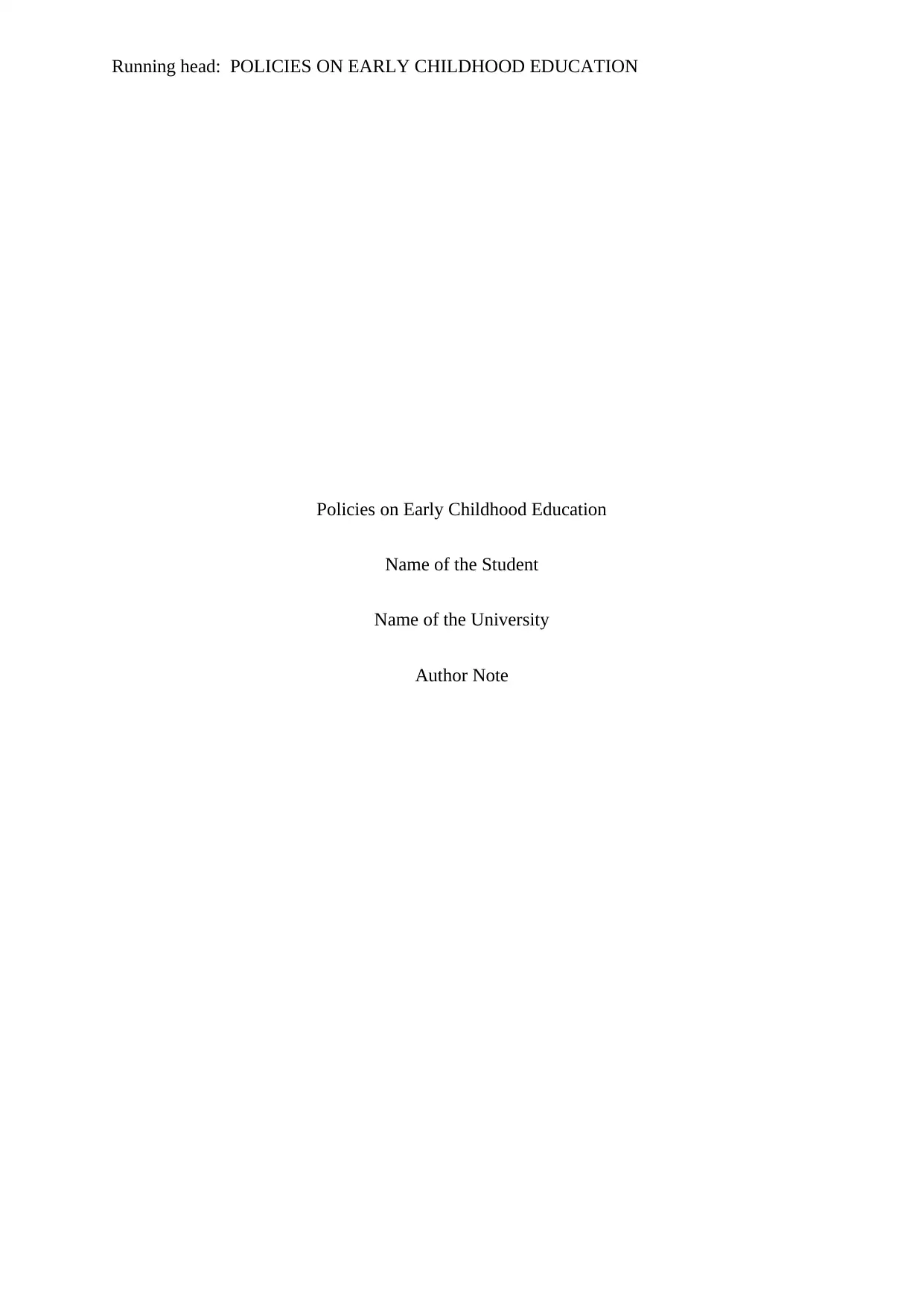
Running head: POLICIES ON EARLY CHILDHOOD EDUCATION
Policies on Early Childhood Education
Name of the Student
Name of the University
Author Note
Policies on Early Childhood Education
Name of the Student
Name of the University
Author Note
Paraphrase This Document
Need a fresh take? Get an instant paraphrase of this document with our AI Paraphraser
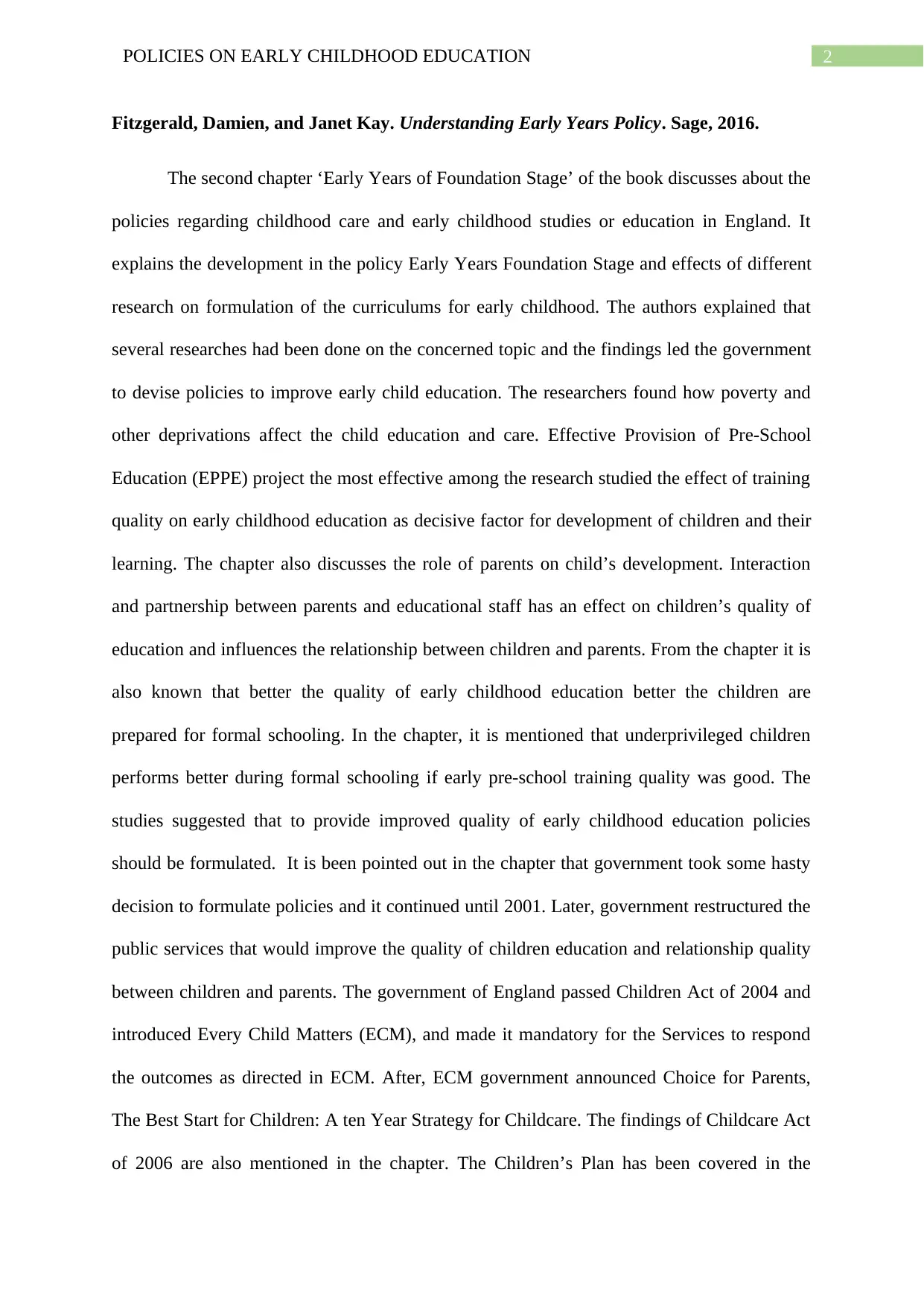
2POLICIES ON EARLY CHILDHOOD EDUCATION
Fitzgerald, Damien, and Janet Kay. Understanding Early Years Policy. Sage, 2016.
The second chapter ‘Early Years of Foundation Stage’ of the book discusses about the
policies regarding childhood care and early childhood studies or education in England. It
explains the development in the policy Early Years Foundation Stage and effects of different
research on formulation of the curriculums for early childhood. The authors explained that
several researches had been done on the concerned topic and the findings led the government
to devise policies to improve early child education. The researchers found how poverty and
other deprivations affect the child education and care. Effective Provision of Pre-School
Education (EPPE) project the most effective among the research studied the effect of training
quality on early childhood education as decisive factor for development of children and their
learning. The chapter also discusses the role of parents on child’s development. Interaction
and partnership between parents and educational staff has an effect on children’s quality of
education and influences the relationship between children and parents. From the chapter it is
also known that better the quality of early childhood education better the children are
prepared for formal schooling. In the chapter, it is mentioned that underprivileged children
performs better during formal schooling if early pre-school training quality was good. The
studies suggested that to provide improved quality of early childhood education policies
should be formulated. It is been pointed out in the chapter that government took some hasty
decision to formulate policies and it continued until 2001. Later, government restructured the
public services that would improve the quality of children education and relationship quality
between children and parents. The government of England passed Children Act of 2004 and
introduced Every Child Matters (ECM), and made it mandatory for the Services to respond
the outcomes as directed in ECM. After, ECM government announced Choice for Parents,
The Best Start for Children: A ten Year Strategy for Childcare. The findings of Childcare Act
of 2006 are also mentioned in the chapter. The Children’s Plan has been covered in the
Fitzgerald, Damien, and Janet Kay. Understanding Early Years Policy. Sage, 2016.
The second chapter ‘Early Years of Foundation Stage’ of the book discusses about the
policies regarding childhood care and early childhood studies or education in England. It
explains the development in the policy Early Years Foundation Stage and effects of different
research on formulation of the curriculums for early childhood. The authors explained that
several researches had been done on the concerned topic and the findings led the government
to devise policies to improve early child education. The researchers found how poverty and
other deprivations affect the child education and care. Effective Provision of Pre-School
Education (EPPE) project the most effective among the research studied the effect of training
quality on early childhood education as decisive factor for development of children and their
learning. The chapter also discusses the role of parents on child’s development. Interaction
and partnership between parents and educational staff has an effect on children’s quality of
education and influences the relationship between children and parents. From the chapter it is
also known that better the quality of early childhood education better the children are
prepared for formal schooling. In the chapter, it is mentioned that underprivileged children
performs better during formal schooling if early pre-school training quality was good. The
studies suggested that to provide improved quality of early childhood education policies
should be formulated. It is been pointed out in the chapter that government took some hasty
decision to formulate policies and it continued until 2001. Later, government restructured the
public services that would improve the quality of children education and relationship quality
between children and parents. The government of England passed Children Act of 2004 and
introduced Every Child Matters (ECM), and made it mandatory for the Services to respond
the outcomes as directed in ECM. After, ECM government announced Choice for Parents,
The Best Start for Children: A ten Year Strategy for Childcare. The findings of Childcare Act
of 2006 are also mentioned in the chapter. The Children’s Plan has been covered in the
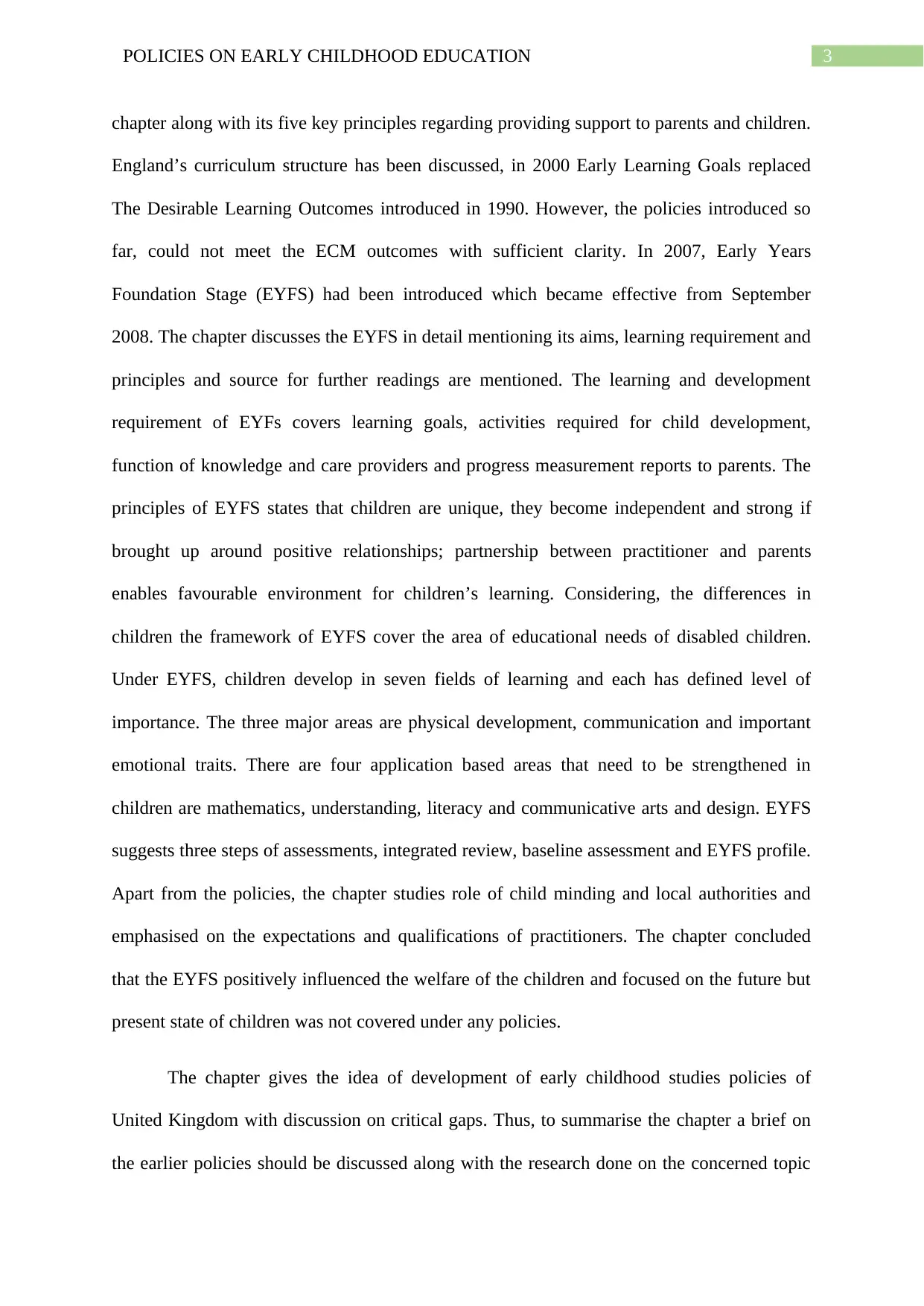
3POLICIES ON EARLY CHILDHOOD EDUCATION
chapter along with its five key principles regarding providing support to parents and children.
England’s curriculum structure has been discussed, in 2000 Early Learning Goals replaced
The Desirable Learning Outcomes introduced in 1990. However, the policies introduced so
far, could not meet the ECM outcomes with sufficient clarity. In 2007, Early Years
Foundation Stage (EYFS) had been introduced which became effective from September
2008. The chapter discusses the EYFS in detail mentioning its aims, learning requirement and
principles and source for further readings are mentioned. The learning and development
requirement of EYFs covers learning goals, activities required for child development,
function of knowledge and care providers and progress measurement reports to parents. The
principles of EYFS states that children are unique, they become independent and strong if
brought up around positive relationships; partnership between practitioner and parents
enables favourable environment for children’s learning. Considering, the differences in
children the framework of EYFS cover the area of educational needs of disabled children.
Under EYFS, children develop in seven fields of learning and each has defined level of
importance. The three major areas are physical development, communication and important
emotional traits. There are four application based areas that need to be strengthened in
children are mathematics, understanding, literacy and communicative arts and design. EYFS
suggests three steps of assessments, integrated review, baseline assessment and EYFS profile.
Apart from the policies, the chapter studies role of child minding and local authorities and
emphasised on the expectations and qualifications of practitioners. The chapter concluded
that the EYFS positively influenced the welfare of the children and focused on the future but
present state of children was not covered under any policies.
The chapter gives the idea of development of early childhood studies policies of
United Kingdom with discussion on critical gaps. Thus, to summarise the chapter a brief on
the earlier policies should be discussed along with the research done on the concerned topic
chapter along with its five key principles regarding providing support to parents and children.
England’s curriculum structure has been discussed, in 2000 Early Learning Goals replaced
The Desirable Learning Outcomes introduced in 1990. However, the policies introduced so
far, could not meet the ECM outcomes with sufficient clarity. In 2007, Early Years
Foundation Stage (EYFS) had been introduced which became effective from September
2008. The chapter discusses the EYFS in detail mentioning its aims, learning requirement and
principles and source for further readings are mentioned. The learning and development
requirement of EYFs covers learning goals, activities required for child development,
function of knowledge and care providers and progress measurement reports to parents. The
principles of EYFS states that children are unique, they become independent and strong if
brought up around positive relationships; partnership between practitioner and parents
enables favourable environment for children’s learning. Considering, the differences in
children the framework of EYFS cover the area of educational needs of disabled children.
Under EYFS, children develop in seven fields of learning and each has defined level of
importance. The three major areas are physical development, communication and important
emotional traits. There are four application based areas that need to be strengthened in
children are mathematics, understanding, literacy and communicative arts and design. EYFS
suggests three steps of assessments, integrated review, baseline assessment and EYFS profile.
Apart from the policies, the chapter studies role of child minding and local authorities and
emphasised on the expectations and qualifications of practitioners. The chapter concluded
that the EYFS positively influenced the welfare of the children and focused on the future but
present state of children was not covered under any policies.
The chapter gives the idea of development of early childhood studies policies of
United Kingdom with discussion on critical gaps. Thus, to summarise the chapter a brief on
the earlier policies should be discussed along with the research done on the concerned topic
⊘ This is a preview!⊘
Do you want full access?
Subscribe today to unlock all pages.

Trusted by 1+ million students worldwide
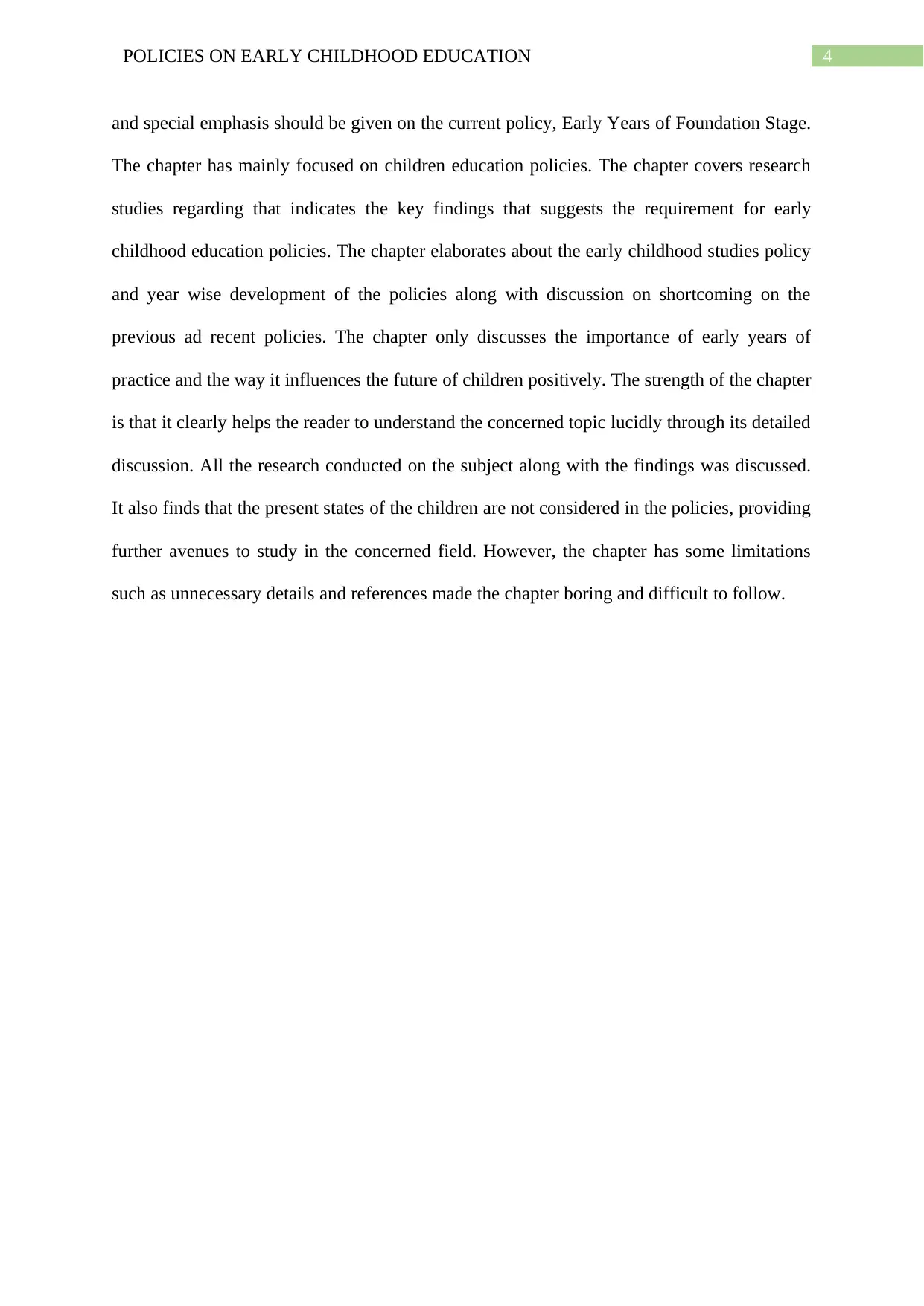
4POLICIES ON EARLY CHILDHOOD EDUCATION
and special emphasis should be given on the current policy, Early Years of Foundation Stage.
The chapter has mainly focused on children education policies. The chapter covers research
studies regarding that indicates the key findings that suggests the requirement for early
childhood education policies. The chapter elaborates about the early childhood studies policy
and year wise development of the policies along with discussion on shortcoming on the
previous ad recent policies. The chapter only discusses the importance of early years of
practice and the way it influences the future of children positively. The strength of the chapter
is that it clearly helps the reader to understand the concerned topic lucidly through its detailed
discussion. All the research conducted on the subject along with the findings was discussed.
It also finds that the present states of the children are not considered in the policies, providing
further avenues to study in the concerned field. However, the chapter has some limitations
such as unnecessary details and references made the chapter boring and difficult to follow.
and special emphasis should be given on the current policy, Early Years of Foundation Stage.
The chapter has mainly focused on children education policies. The chapter covers research
studies regarding that indicates the key findings that suggests the requirement for early
childhood education policies. The chapter elaborates about the early childhood studies policy
and year wise development of the policies along with discussion on shortcoming on the
previous ad recent policies. The chapter only discusses the importance of early years of
practice and the way it influences the future of children positively. The strength of the chapter
is that it clearly helps the reader to understand the concerned topic lucidly through its detailed
discussion. All the research conducted on the subject along with the findings was discussed.
It also finds that the present states of the children are not considered in the policies, providing
further avenues to study in the concerned field. However, the chapter has some limitations
such as unnecessary details and references made the chapter boring and difficult to follow.
Paraphrase This Document
Need a fresh take? Get an instant paraphrase of this document with our AI Paraphraser
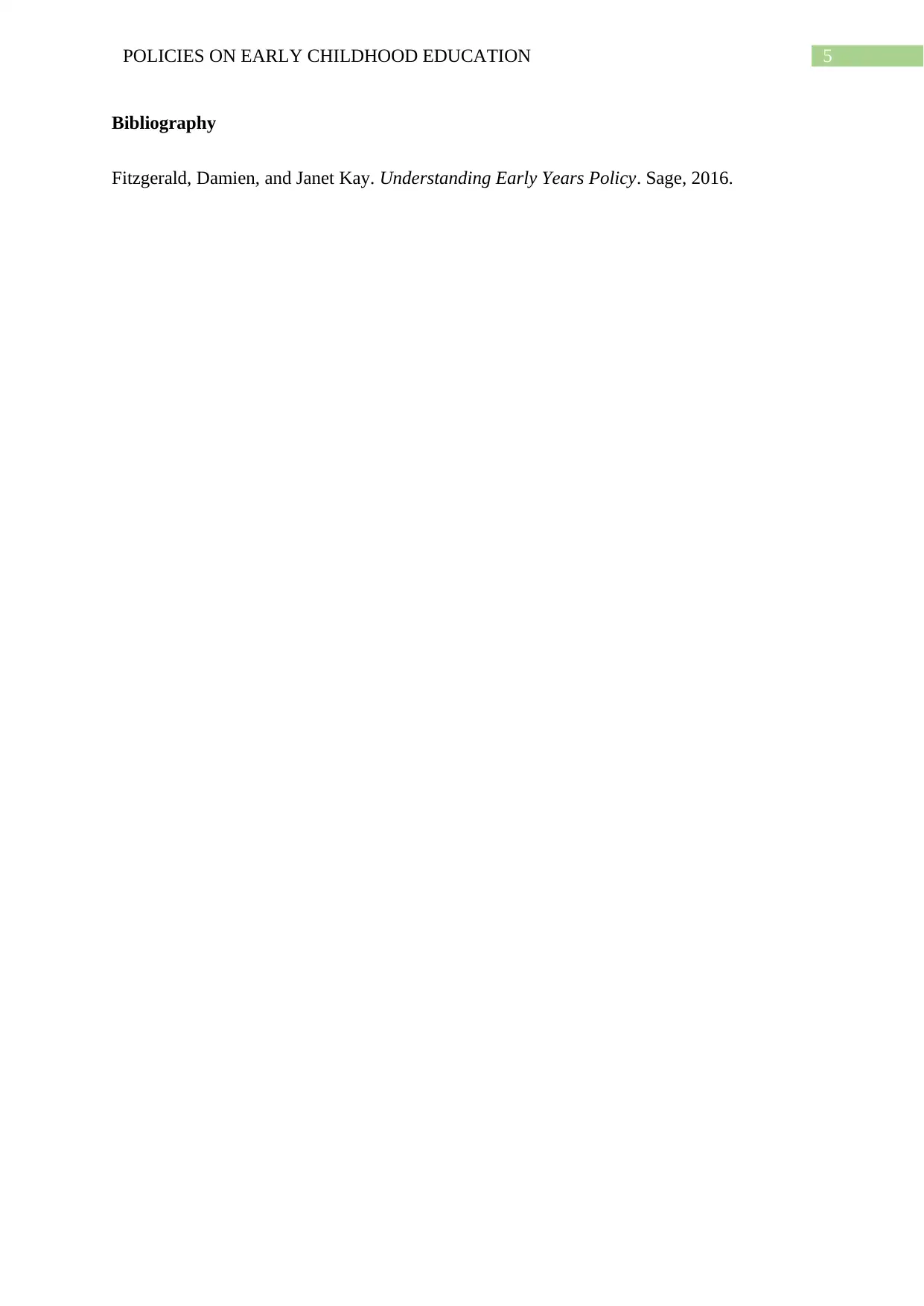
5POLICIES ON EARLY CHILDHOOD EDUCATION
Bibliography
Fitzgerald, Damien, and Janet Kay. Understanding Early Years Policy. Sage, 2016.
Bibliography
Fitzgerald, Damien, and Janet Kay. Understanding Early Years Policy. Sage, 2016.
1 out of 5
Related Documents
Your All-in-One AI-Powered Toolkit for Academic Success.
+13062052269
info@desklib.com
Available 24*7 on WhatsApp / Email
![[object Object]](/_next/static/media/star-bottom.7253800d.svg)
Unlock your academic potential
Copyright © 2020–2026 A2Z Services. All Rights Reserved. Developed and managed by ZUCOL.





